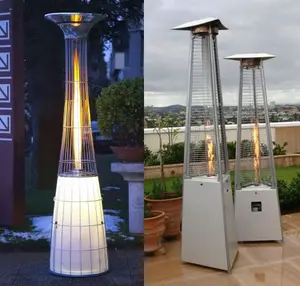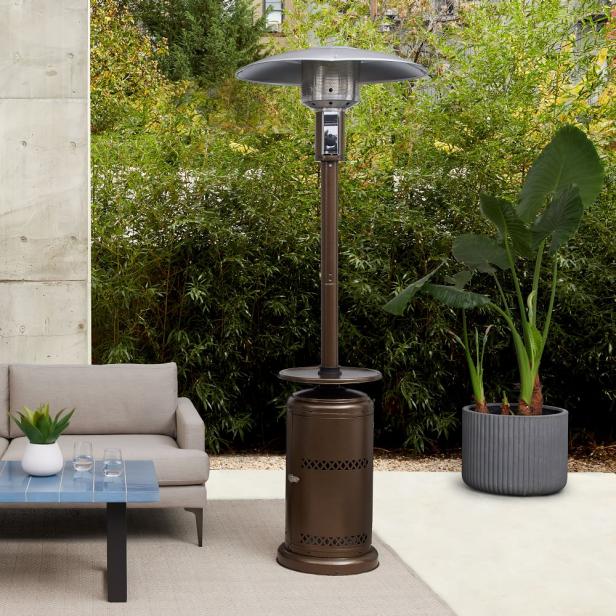Embracing Comfort: A Comprehensive Guide to Outdoor Heaters
Outdoor heaters are purpose-built devices designed to provide warmth and comfort in outdoor spaces, allowing individuals to extend their time outside regardless of the weather. These heaters come in various types, including patio heaters, fire pits, infrared heaters, and tabletop heaters. They utilize different fuel sources such as propane, natural gas, or electricity to generate heat. Whether for residential or commercial use, outdoor heaters offer versatility, allowing people to create inviting outdoor environments for socializing, dining, or relaxation. Their key features often include various safety measures, portability, and designs that complement different outdoor settings. With an array of sizes and styles available, outdoor heaters cater to diverse needs, providing an opportunity to enjoy the beauty of the outdoors year-round.
Understanding Outdoor Heaters.

As the allure of the great outdoors beckons us, the quest to make outdoor spaces comfortable and inviting has become a paramount concern. Whether it's a chilly evening on a patio, a crisp fall day on the deck, or a winter gathering in the garden, the desire to extend outdoor living beyond the constraints of weather is a shared aspiration. The solution to this predicament lies in the innovation and functionality of outdoor heaters, which provide warmth and comfort, enabling us to relish the beauty of the outdoors regardless of the season.
Understanding Outdoor Heaters
Types of Outdoor Heaters
Outdoor heaters come in various forms, each with its unique characteristics and suitability for different spaces and purposes:
- Patio Heaters: These stand-alone units, often powered by propane, natural gas, or electricity, are designed for heating specific areas. They radiate heat in a circular pattern, making them ideal for outdoor dining areas or patios.
- Fire Pits and Fireplaces: These offer both warmth and ambiance. Fire pits come in different sizes and can be portable or fixed installations, while fireplaces add a touch of elegance to outdoor spaces, functioning as a focal point for gatherings.
- Infrared Heaters: These heaters use infrared technology to heat objects and people directly, rather than the surrounding air. They can be mounted on walls or ceilings, making them a space-saving and efficient choice.
- Tabletop Heaters: Compact and portable, these heaters are placed on outdoor tables, providing localized warmth, perfect for smaller spaces or intimate gatherings.
Factors to Consider When Choosing an Outdoor Heater
1. Heat Source:
Electric: These heaters are convenient and eco-friendly, requiring access to a power source. They generate instant heat and are suitable for enclosed spaces.
Gas (Propane or Natural Gas): Gas-powered heaters are versatile and often more powerful. They don’t rely on electrical outlets, making them suitable for larger outdoor areas. Propane heaters are portable, while natural gas heaters require a fixed gas line.
2. Heating Capacity: Consider the square footage of the area you intend to heat and the heater's coverage area to ensure it can effectively warm the space.
3. Design and Aesthetics: Outdoor heaters come in various styles and designs to complement the aesthetic of your outdoor space. Whether you prefer a sleek modern look or a more traditional feel, there's an option to suit every taste.
4. Safety Features: Look for heaters with safety features like tip-over switches, auto-shutoff mechanisms, and cool-to-touch surfaces, especially if children or pets will be around.
5. Portability and Installation: Consider whether you need a fixed, permanent heater or a portable option that can be easily moved around. Installation and assembly should also be taken into account.

Benefits of Outdoor Heaters
1. Extending the Outdoor Season: Outdoor heaters allow you to enjoy your outdoor space year-round, transforming chilly nights into cozy and inviting gatherings.
2. Comfort and Ambiance: The warmth emitted by outdoor heaters not only provides physical comfort but also creates an inviting ambiance, perfect for socializing, dining, or simply relaxing outdoors.
3. Versatility: With various types and sizes available, outdoor heaters cater to different needs, whether you have a small balcony or a vast backyard.
4. Energy Efficiency: Newer models of outdoor heaters are designed to be energy-efficient, ensuring you can stay warm without causing a substantial impact on your energy bills or the environment.
What type of heater is best for outside?
The choice of the best outdoor heater depends on various factors such as the specific outdoor space, heating capacity required, available power sources, and individual preferences. Patio heaters are often a popular choice as they're versatile, providing good coverage for specific areas. However, the "best" type may vary; for instance, fire pits or fireplaces are great for ambiance but might not be as effective for heating larger spaces. Infrared heaters are efficient in directing heat to specific areas and come in wall-mounted or freestanding forms. The ideal type depends on the particular needs and aesthetics of the outdoor space.
Do outdoor heaters need electricity?
Not all outdoor heaters require electricity. While some outdoor heaters, like electric infrared heaters, run on electricity, there are other types that use alternative fuel sources such as propane or natural gas. For example, patio heaters often have models that use propane, while natural gas heaters require a fixed gas line. However, electric heaters are convenient for areas with easy access to power sources, as they provide instant heat and are generally more environmentally friendly.
How long do outdoor heaters last?
The lifespan of outdoor heaters varies depending on the type, quality, and maintenance. Generally, well-maintained and high-quality outdoor heaters can last anywhere between 5 to 10 years or more. Electric heaters might have a longer lifespan compared to gas-powered ones due to fewer moving parts and lower maintenance requirements. Regular upkeep, including cleaning, inspection, and servicing, can significantly impact the longevity of the heaters.

What are outdoor heaters called?
Outdoor heaters go by various names based on their type and functionality. Common names for outdoor heaters include patio heaters, fire pits, fireplaces, infrared heaters, tabletop heaters, and radiant heaters. These different types serve the purpose of providing warmth and comfort in outdoor settings, each with its own design, fuel source, and heating method.
Advantages of Outdoor Heaters
- Extended Outdoor Enjoyment: Outdoor heaters enable individuals to extend their time spent in outdoor spaces, regardless of the season. They offer warmth during chilly evenings or colder months, making patios, decks, and gardens inviting and comfortable.
- Versatility: There is a wide range of outdoor heater options available, catering to different space sizes, design preferences, and heating capacities. From portable tabletop heaters to large fire pits, they offer versatility for various outdoor settings.
- Socialization and Ambiance: The warmth emitted by outdoor heaters not only provides comfort but also creates an inviting ambiance. They facilitate social gatherings, intimate conversations, and outdoor dining experiences, enhancing the overall atmosphere.
- Energy Efficiency: Many modern outdoor heaters are designed to be energy-efficient, consuming minimal energy while providing substantial heat. Electric heaters, for instance, offer instant heat and can be cost-effective in smaller areas.
- Safety Features: Most outdoor heaters come with safety features such as tip-over switches, auto-shutoff mechanisms, and cool-to-touch surfaces, ensuring a safe experience, especially in the presence of children and pets.
Disadvantages of Outdoor Heaters
- Operational Costs: Depending on the type of heater and the fuel it uses, operational costs can vary. Gas-powered heaters, especially propane, might involve ongoing expenses for fuel refills. Electric heaters might increase energy bills, particularly in larger spaces.
- Environmental Impact: Gas-powered heaters can contribute to carbon emissions, impacting the environment. However, newer models aim for more eco-friendly operations, reducing their environmental footprint.
- Installation and Space Consideration: Some outdoor heaters, like fixed natural gas heaters or fireplaces, might require professional installation. Additionally, space availability and heater size must be considered for optimal functionality and safety.
- Limited Heat Range: Some heaters have limited heat ranges, making them suitable for specific areas. Patio heaters, for instance, radiate heat in a circular pattern, which might not cover a large outdoor space evenly.
- Weather Dependence: Extreme weather conditions like strong winds or heavy rain can affect the efficiency of outdoor heaters, limiting their functionality and effectiveness during certain situations.

Purpose of Outdoor Heaters
The purpose of outdoor heaters is multifaceted, aiming to enhance and extend the use of outdoor spaces in various weather conditions. Their primary objectives and purposes include:
- Comfort and Warmth: The fundamental purpose of outdoor heaters is to provide warmth and comfort, allowing individuals to enjoy outdoor areas during colder seasons or chilly evenings. They enable people to experience outdoor living spaces without being constrained by weather limitations.
- Extended Use of Outdoor Spaces: By providing a source of heat, outdoor heaters expand the functionality of outdoor areas. Patios, decks, gardens, and outdoor dining areas become usable year-round, encouraging people to spend more time outdoors despite temperature drops.
- Facilitating Social Gatherings: Outdoor heaters create a more inviting environment for social gatherings. They encourage outdoor activities such as barbecues, parties, or simply relaxing with friends and family, fostering a sense of togetherness.
- Ambiance and Aesthetics: Beyond warmth, outdoor heaters contribute to the overall ambiance of outdoor spaces. Fire pits and fireplaces, for example, add a cozy and intimate atmosphere, creating a focal point and enhancing the aesthetics of the outdoor setting.
- Versatility in Options: Outdoor heaters come in various types and sizes, catering to different needs and space requirements. From portable tabletop heaters to larger fixed installations, they offer versatility to accommodate various outdoor settings and personal preferences.
- Practicality and Convenience: These heaters offer practical solutions for businesses like restaurants with outdoor seating, allowing them to continue serving customers during colder seasons. They also provide a convenient way for individuals to enjoy their outdoor space without discomfort.
- Energy Efficiency and Safety: Modern outdoor heaters often come equipped with safety features and some models are designed to be energy-efficient, providing warmth without significant impact on energy bills or the environment.
Outdoor heaters are a gateway to extending our living spaces and experiences beyond the confines of interior walls. They offer a means to savor the beauty of nature, engage in outdoor activities, and relish moments with family and friends regardless of the weather. The wide array of options available ensures that there's a suitable heater for every outdoor space, need, and preference. As technology advances and sustainability becomes a crucial focus, outdoor heaters continue to evolve, providing efficient, eco-friendly, and stylish solutions for outdoor comfort.
The decision to invest in an outdoor heater involves considering the size and layout of your outdoor space, your heating preferences, and safety considerations. However, the ultimate reward is the ability to bask in the glory of the outdoors, enveloped in warmth and comfort, year-round.



